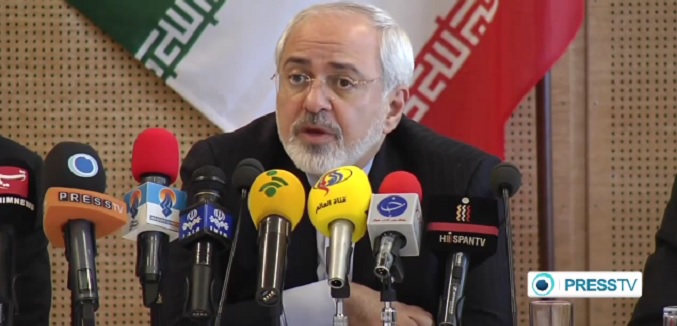Iran’s ambassador to Russia, Mehdi Sanaei, on Wednesday announced on Facebook that Iranian Foreign Minister Mohammad Javad Zarif will visit Russia next week to participate in a conference on Caspian energy and that the country’s president, Hassan Rouhani, would follow in September for a similarly themed meeting with counterparts.
The Times of Israel read the announcement against the backdrop of warming Iranian-Russian ties:
Sanaei also said Iranian President Hassan Rouhani would visit Russia in September for a meeting of the heads of the Caspian Sea countries.
Iran and Russia are close allies. In Syria’s civil war, both nations have supported President Bashar Assad’s regime against mainly Sunni rebels.
In January, Rouhani told Russian President Vladimir Putin that establishing long-term relations between the two countries “can serve the stability and security of the region.”
The developments are also likely to be read alongside deepening concerns that tensions between the Kremlin and the West are likely to undermine international talks between Iran and the P5+1 global powers, a group in which Russia is a member. Slate international affairs writer Joshua Keating wrote yesterday that a range of geostrategic and diplomatic dynamics – from European energy considerations to straightforward retaliation by the Russians – may see the Ukraine crisis boosting Iran’s prospects:
The Ukraine crisis may also impact the ongoing international negotiations over the country’s nuclear program, where Moscow has traditionally been Iran’s primary backer. Russia’s delegate to the talks between Iran and the P5+1, Deputy Foreign Minister Sergei A. Ryabkov, hinted last month that “We wouldn’t like to use these talks as an element of the game of raising the stakes. … But if they force us into that, we will take retaliatory measures here as well.”
The P5+1 have, with fits and starts, showed signs of presenting a united front on sanctions and Iran’s nuclear program. Any division in the ranks is likely to be to Iran’s advantage in the talks going forward.
Top Russian diplomats have threatened to “raise the stakes” of the crisis by shifting their stance on Iran talks, and Moscow has very publicly declared that it is in any case forging ahead with a $20 billion sanctions-busting scheme that would see Iran barter oil for goods. The Obama administration has thus far brushed off concerns that Russian calculations may see their diplomats undermining the West’s approach to Iran, insisting instead that the Kremlin would “compartmentalize” various processes.
At stake is the degree to which Washington and its European allies have sufficient leverage to convince the Iranians to verifiably put their atomic program beyond use for weaponization. Quantitative economic indicators, summed up this week in a new IMF report, indicate that Iran’s economy has stabilized and is primed for growth “even if sanctions relief under [the interim Joint Plan of Action (JPA)] deal proves short-lived.”
Iranian officials on Wednesday seized on an anticipated U.N. report, which will document that Tehran is meeting its JPA obligations to dilute the most highly enriched portions of its uranium stockpile, to demand the next tranche of money promised by the JPA:
Under the preliminary agreement that took effect on Jan. 20, Iran will receive a total of $4.2 billion of blocked funds in eight payments over six months, if it lives up to its part of the deal designed to allay fears about its atomic aims.
It says it has already received four transfers in February and March, totalling some $2.1 billion. A fifth payment of $450 million was due on April 15, contingent on Iran having diluted half of its most sensitive stockpile of nuclear materials. Diplomats say Iran is meeting its commitments under the accord.
Deputy Foreign Minister Majid Takht-Ravanchi, a senior member of Iran’s nuclear negotiating team, told the official IRNA news agency Tuesday that the latest instalment “was to be freed today.”
Arms control expert Mark Hibbs, a senior associate at the Carnegie Endowment for International Peace’s nuclear policy program, has estimated that it would take Iran roughly one to two weeks to reverse the dilution process. It is unlikely that, should Iranian lawmakers choose to do so, they would return the money.
[Photo: PressTV News Videos / YouTube]




